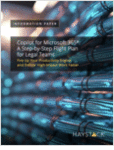As more people discover the ease of using e-mail, and as more important information is transmitted electronically, the lure of intercepting messages rises proportionately. With the proliferation of e-mail, confidential and sensitive business discussions, as well as personal conversations, are undertaken electronically rather than by telephone. Clients, for example, transmit to lawyers or other agents their true negotiation limits.
Now that such conversations are documented in traceable form via e-mail, a curious third party may be tempted to eavesdrop on these electronic exchanges in the mistaken belief that such unauthorized access is not traceable or actionable. Congress and many state legislatures, however, have expressly prohibited this conduct. Gathering competitive information through interception of e-mail, or receipt of intercepted e-mail, can give rise to both criminal and civil liability.
This content has been archived. It is available through our partners, LexisNexis® and Bloomberg Law.
To view this content, please continue to their sites.
Not a Lexis Subscriber?
Subscribe Now
Not a Bloomberg Law Subscriber?
Subscribe Now
LexisNexis® and Bloomberg Law are third party online distributors of the broad collection of current and archived versions of ALM's legal news publications. LexisNexis® and Bloomberg Law customers are able to access and use ALM's content, including content from the National Law Journal, The American Lawyer, Legaltech News, The New York Law Journal, and Corporate Counsel, as well as other sources of legal information.
For questions call 1-877-256-2472 or contact us at [email protected]




